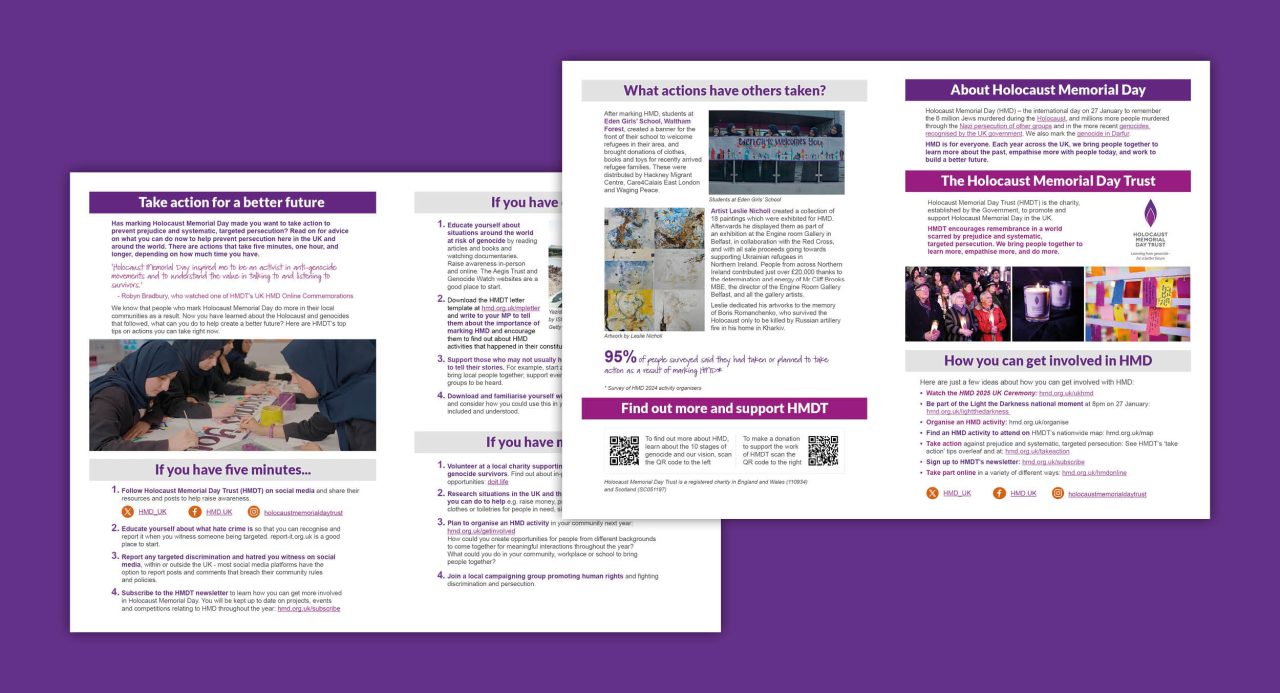
Smajo Bešo OBE
Smajo Bešo has seen the worst and best of humanity. After surviving the horrors of the genocide in Bosnia, he found refuge and safety in the UK where he now proudly embraces his Bosnian roots and new-found Geordie identity.
Our resources can help you learn more about the Holocaust and genocide and plan your own HMD activity. Explore life stories of survivors and those who were murdered, virtual activities, schools materials, films, images and more. You can filter them by genocide and type of resource.

Smajo Bešo has seen the worst and best of humanity. After surviving the horrors of the genocide in Bosnia, he found refuge and safety in the UK where he now proudly embraces his Bosnian roots and new-found Geordie identity.

This resource is designed for Scottish secondary schools to mark HMD while supporting and complementing Burns Night celebrations. Read the story of Henry Wuga MBE who was born in Germany in 1924 and escaped the Holocaust by coming to Scotland on the Kindertransport. He made a home in Scotland and developed a love for Scotland's national bard Robert Burns.

The Sikh Princess who helped Jewish Families escape Nazi Germany.

Sanela Saracevic managed to escape the horrors of the Bosnian war in 1993, yet the memories of its atrocities continue to haunt her. With her family, she was compelled to leave her homeland in pursuit of safety. She has transformed her painful past into a source of inspiration, using it to nurture hope for a better future.

This learning resource explores antisemitism (anti-Jewish hatred) and discrimination during the Nazi era and today. The content of the lesson is designed to encourage reflection on identity-based discrimination that has taken place and continues to occur.

These resources have been created to provide educators and Holocaust Memorial Day (HMD) activity organisers with suggested films that talk to both the Holocaust and more recent genocides in Cambodia, Rwanda, Bosnia and Darfur. The resources also provide discussion points, questions and suggestions for further activities to take forward your learning and engagement with the Holocaust and more recent genocides.
![[Extra]Ordinary Portraits – A resource](https://hmd.org.uk/wp-content/uploads/2023/09/WhatsApp-Image-2022-09-23-at-12.11.46-PM-4.jpeg)
This resource supports teachers and youth leaders in engaging young people to explore experiences of persecution and discrimination through art.

Download our About HMD flyers and booklets to give out at your Holocaust Memorial Day activities. They provide information about the Holocaust, more recent genocides, and Holocaust Memorial Day.
This digital exhibition can be used at your Holocaust Memorial Day (HMD) activity. It showcases [Extra]Ordinary Portraits, a collection of 30 artworks by young people (aged between 10-25) that reveal the ‘extraordinary elements of seemingly ordinary people’.
Darfur is a region in the west of Sudan, bordering Chad, in north-east Africa. In 2003, the Sudanese Government armed militia - the Janjaweed – to attack black African people in Darfur. This short film explains how the genocide in Darfur unfolded, and how violence continues there today.